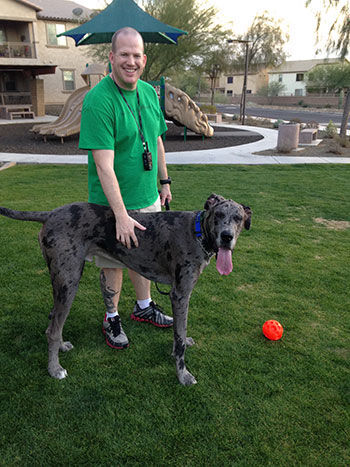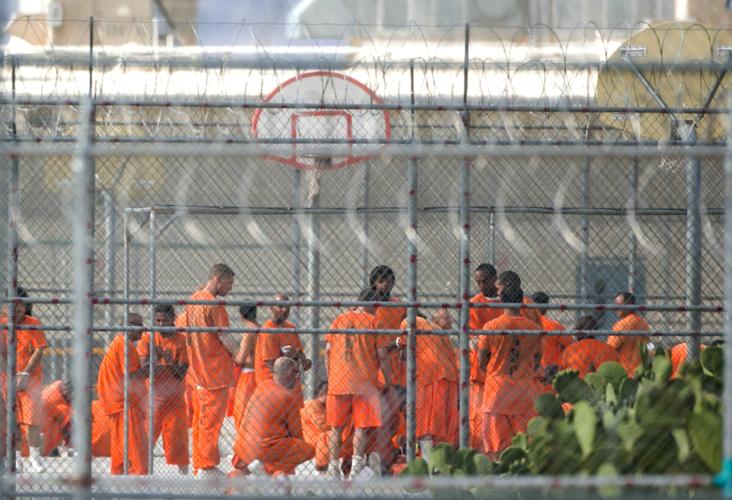Matthew Rohrbach has no children of his own, just his wife and a 170-pound Great Dane named Loki. Instead, he has been involved in Big Brothers Big Sisters of Central Arizona and is matched with 15-year-old Mick — whose father is in prison.
Mick is among at least 176,000 Arizona children and teens who have a parent serving time, according to the Tucson-based KARE Family Center, which helps relatives cope with caring for children whose parents are imprisoned.
When Mick was 3 years old, his father was arrested for manufacturing and selling methamphetamine, along with charges of reckless child abuse related to his drug crimes, according to court reports.
“Multiple times so far, he’s told me how his dad was going to get an appeal hearing and potentially get out early,” said Rohrbach, 38. “As far as I know, the guy doesn’t stand a chance of getting out before Mick turns 21.”
According to inmate information from the Arizona Department of Corrections, his father is not scheduled for release until 2024.
“I don’t like seeing the kid think his dad’s going to get out when his dad’s not,” Rohrbach said.
The Census Bureau estimates there are 1.6 million children living in Arizona: That means one in nine has a parent who is in prison, or on parole or probation.
Rohrbach said Mick’s family now has a limited income. His mother also was charged in connection with his father’s crimes and received two years of probation, according to records.
On any given day, there are an estimated 2.7 million children in America with at least one parent in prison or jail, reports the National Resource Center for Children of the Incarcerated based at Rutgers University.
Family members and caregivers of these children also “bear numerous burdens, including stigma and shame associated with having a family member in prison, increased financial strain, physical and emotional stress, and lack of external resources,” according to the center.
Mick talks to his father and the two have discussed starting a business when he’s released from prison by turning old medical buildings into rehabilitation centers. But Rohrbach doesn’t think this is in Mick’s best interest. Mick has talked about joining the Navy; Rohrbach encourages this.
“He needs that structure, that disciplinary figure above him,” Rohrbach said. “His behavior indicates that he’s a lot more flexible to go outside of the rules. The nature of both of his parents’ history … I think he’ll still have the potential for getting into trouble because of what he saw growing up.”
Kevin Wright sees the impact on children firsthand.
Wright, a criminology and criminal justice assistant professor at Arizona State University, is conducting a study on visitation at the Arizona State Prison Complex in Florence.
He said that younger kids are often excited to visit. However, preteens and teens place more importance on self-image, and Wright said they dislike the visits.
“You might be embarrassed that you have a parent that’s in prison,” Wright said. “When you’re that age, the most important thing is your friends and whatever you’re doing that day.”
He observed two girls visiting their father. One was about 12 years old and one was about 5.
The younger daughter laughed, was energetic and treated the visitation center as if it were a “playground,” Wright wrote in one of his reports, “Moving Prison Visitation Research Forward: The Arizona Prison Visitation Project.”
“The younger daughter was so happy to be there, bouncing all around and at one point she was like, ‘Daddy, where are we?’” Wright said.
The dad seemed uncomfortable. He avoided the question. The older daughter, with her arms crossed, responded abruptly.
“Prison. We’re in prison.”
Pat Krug has been a mentor with Big Brothers Big Sisters for more than 20 years. Ann, her current match, will be 15 in February.
Ann’s father has been incarcerated multiple times, mostly for drug-related crime. His multiple-arrest record is not unusual — according to the Arizona Department of Corrections, Arizona’s recidivism rate is at 37.5 percent.
“He has a drug habit, so (Ann) finds it hard to understand that when he tells her, ‘I love you,’ and, ‘I’m going to make it on the outside,’ and, ‘I want to see you,’ and all this, she takes that at face value,” Krug said. “Then he ends up back in jail and she thinks that he lied to her.”
Phone calls between Krug and Ann are becoming infrequent, and often the family’s phone service is shut off because they can’t pay the bills, Krug said.
Krug says she tries to keep her role as a mentor in perspective.
“I have to remind myself I’m the big sister, I’m not the parents’ savior, I am not their financial supporter,” she said. “You are, in theory, a big sister who’s trying to grow and develop that person.”





